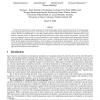Free Online Productivity Tools
i2Speak
i2Symbol
i2OCR
iTex2Img
iWeb2Print
iWeb2Shot
i2Type
iPdf2Split
iPdf2Merge
i2Bopomofo
i2Arabic
i2Style
i2Image
i2PDF
iLatex2Rtf
Sci2ools
GCA
2008
2008
Grid-enabling complex system applications with QosCosGrid: An architectural perspective
Grids are becoming mission-critical components in research and industry, offering sophisticated solutions in leveraging largescale computing and storage resources. Grid resources are usually shared among multiple organizations in an opportunistic manner. However, an opportunistic or "best effort" quality-of-service scheme may be inadequate in situations where a large number of resources need to be allocated and applications which rely on static, stable execution environments. The goal of this work is to implement what we refer to as quasi-opportunistic supercomputing. A quasi-opportunistic supercomputer facilitates demanding parallel computing applications on the basis of massive, nondedicated resources in grid computing environments. Within the EU-support project QosCosGrid we are developing a quasi-opportunistic supercomputer. In this work we present the results obtained from studying and identifying the requirements a grid needs to met in order to facilitate quasi-opportu...
Distributed And Parallel Computing | GCA 2008 | Grid | Quasi-opportunistic Supercomputer | Quasi-opportunistic Supercomputing |
Related Content
| Added | 29 Oct 2010 |
| Updated | 29 Oct 2010 |
| Type | Conference |
| Year | 2008 |
| Where | GCA |
| Authors | Valentin Kravtsov, David Carmeli, Werner Dubitzky, Krzysztof Kurowski, Assaf Schuster |
Comments (0)

